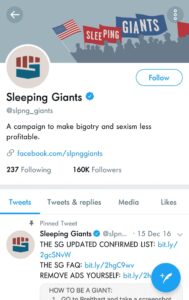Sleeping Giants
Some thoughts…
November 4, 2020It shouldn’t have been this close. After four years of cruel practices and criminal behavior, too many Americans who voted said, “Yeah, this is good.” So much to unpack. Beyond a divided–deeply divided–nation, the people of the United States are in a cold war, seemingly separated by identity politics–tragically, much of the divisiveness is born of disinformation, state television, and far right social media platforms. It will not end. Even if DT loses, he will lead a shadow presidency, haunting and restricting through his amplified media, restrict and diminish forward moving policy. A deeply Republican senate, led by an evil spirit…not hyperbole…along with a 6/3 Supreme Court, will basically make Biden a lame duck, while he tries to heal a nation.
“Win or lose, a lot more people voted for him this year, after watching him as president for four years, than voted for him last time.” [social media post]
It is dark day in this country. And we have so much to atone.
Today, post election and with votes still be counted, coupled with coup behavior and rhetoric from the current president, democracy seems to be only a frame of mind in this country…perhaps it always has been.
From Sleeping Giants:
“No matter what happens with this election, we’re going to have to contend with a media and social media ecosystem that rewards, incentivizes and monetizes the worst of our society, from hate to disinformation to harassment. It’s cooked into the business model. We currently live in a world where the largest advertisers support a network that openly espouses xenophobic, white supremacist ideas, carelessly spreads disinformation and sics it’s viewers on people with whom they disagree, putting them in danger. We’re dealing with social media platforms whose algorithms give an outsized platform to content that aims to vilify minority groups, drive division and spread falsehoods every single day and platform violent extremists and racists who organize real attacks on their websites. What’s worse is that these outlets and platforms thrive on opposition. It profits them. It’s better for business. It’s not hard to see if there’s a new administration that things will get worse, not better. We need to be more vigilant than ever about asking the companies that support these networks and platforms what kind of world they want to live in and to truly live the values that they outwardly express to their customers. But we also need to ensure that these platforms do not dig further into our government, swaying their policies. We need social media platforms held to account rather than being asked to write policy. They have proven that they cannot be trusted to govern themselves. All of this is to say that, no matter the outcome of the election, the work of activists and researchers and journalists and especially lawmakers is only starting. And that it’s more imperative now than it ever was.”
~
Sharing other voices:
While it’s too soon to know the presidential race outcome, this is clear: we must do more to counter the alternative information space FOX News and other Trump media create for Republicans. The race should not be this close given the objective reality of Trump’s performance.
-Evan McMullin, Former: CIA ops officer, GOP policy director, independent presidential candidate
Incredible how competitive Trump is with 230K Covid deaths and kids being locked in cages and everything else. Even if Biden wins he will have to govern in a trump country. This is who America is.
-Gabriel Sherman, journalist
To be clear, this wasn’t a presidential election, it was just a survey on how much this country loves racism and most white people checked the box for “very satisfied.”
-Robin Thede, actress and writer
“When a country shows you who it is, believe it the first time.”
-Anand Giridharadas
“I think the democratic sadness you’re seeing on social media isn’t fatalism or resignation to a Republican win–it’s sadness that we’re not seeing a full scale repudiation to Trumpism.’
[associate professor in Austin]
Before being Republican or Democrat, be human. Regardless of who wins the US election, no one has greater power over you than you. Our minds & hearts are much greater than any politics, and as sovereign beings, we get to choose peace, empathy & humanity.
-Jennifer Rose
From Fr Richard Rohr today, the day after election:
A Call to Be One
Wednesday, November 4, 2020
I return once again to the prophetic words of Sister Joan Chittister who calls us to make an unflinching commitment to act with integrity—out of the fullness of our being—not simply our pragmatic, comfortable, or fearful selves.
As a people, we are at a crossover moment. It is a call to all of us to be our best, our least superficial, our most serious about what it means to be a Christian as well as a citizen. . . .
Where in the midst of such polarization and national disunity is even the hope of oneing, of integrating the social with what we say are our spiritual selves? . . .
Even the ghost of an answer makes serious spiritual demands on us all: To heal such division means that we are obliged to search out and identify our own personal value system. It requires us to admit to ourselves what it is that really drives our individual social decisions, our votes, our political alliances. Is it the need to look powerful? The desire for personal control? . . . Do we have the courage to confront the debased with the ideal—even in the face of ridicule and recrimination—or is cowardice our secret spiritual sickness? In that case, our national health can only get worse.
A national cure also surely demands that we begin to see tradition as a call to return to the best of the past, not a burden to be overcome in order to secure the best of the present. It is the sense of a commonly held tradition of the common good—once a strong part of the American past—that we clearly lack in the present. . . .
[We must] make “Love one another as I have loved you” (see John 13:34) the foundation of national respect, the standard of our national discernment, the bedrock of both our personal relationships and a civilized society. . . .
To be one, we don’t need one party, one program, one set of policies. What could be duller, more stagnant, more destructive of the soulfulness it takes to create and preserve the best of the human enterprise than such a narrow-minded view of planetary life? What we need is one heart for the world at large, a single-minded commitment to this “more perfect union,” and one national soul, large enough to listen to one another for the sake of the planet—for the sake of us all.
So where can we look for oneing in the political arena? Only within the confines of our own hearts. Politics—government—does not exist for itself and, if it does, that is precisely when it becomes at least death-dealing if not entirely evil. . . .
In the end, politics is nothing more than an instrument of social good and human development. It is meant to be the right arm of those whose souls have melted into God.
More from Richard:
I consider Quaker author and activist Parker Palmer a true elder. He has clearly “fallen upward”—humbly learning and growing over the years while also generously giving of himself to build a better future with the next generation. From that vantage point, Palmer writes:
For those of us who want to see democracy survive and thrive—and we are legion—the heart is where everything begins: that grounded place in each of us where we can overcome fear, rediscover that we are members of one another, and embrace the conflicts that threaten democracy as openings to new life for us and for our nation. . . .
Of all the tensions we must hold in personal and political life, perhaps the most fundamental and most challenging is standing and acting with hope in the “tragic gap.” On one side of that gap, we see the hard realities of the world, realities that can crush our spirits and defeat our hopes. On the other side of that gap, we see real-world possibilities, life as we know it could be because we have seen it that way. . . .
If we are to stand and act with hope in the tragic gap and do it for the long haul, we cannot settle for mere “effectiveness” as the ultimate measure of our failure or success. Yes, we want to be effective in pursuit of important goals. . . . [But] we must judge ourselves by a higher standard than effectiveness, the standard called faithfulness. Are we faithful to the community on which we depend, to doing what we can in response to its pressing needs? Are we faithful to the better angels of our nature and to what they call forth from us? Are we faithful to the eternal conversation of the human race, to speaking and listening in a way that takes us closer to truth? Are we faithful to the call of courage that summons us to witness to the common good, even against great odds? When faithfulness is our standard, we are more likely to sustain our engagement with tasks that will never end: doing justice, loving mercy, and calling the beloved community into being.
Parker Palmer’s understanding of the “tragic gap” recognizes that no matter what we do, we can never completely solve the problem. In all our actions, there is always a space left incomplete, imperfect, which God alone can fill. The search for “the perfect” often keeps us from “the good.” The demand for one single issue about which we can be totally right actually keeps us from reading the whole picture—often this is true in regard to voting.
gate gate pāragate pārasaṃgate bodhi svāhā
भगवतीप्रज्ञापारमिताहृदय
In our ugly and injurious present political climate, it has become all too easy to justify fear-filled and hateful thoughts, words, and actions in defense against the “other” side. We project our anxiety elsewhere and misdiagnose the real problem (the real evil), forever exchanging it for smaller and seemingly more manageable problems. The over-defended ego always sees, hates, and attacks in other people its own faults—the parts of ourselves that we struggle to acknowledge. We do not want to give way on important moral issues, but this often means we don’t want to give way on our need to be right, superior, and in control. It is our deep attachment to this false or manufactured self that leads us into our greatest illusions. Most of us do not see things as they are; we see things as we are.
The Heart Sutra (sometimes called The Heart of the Perfection of Wisdom) is considered by many to be the most succinct and profound summary of Buddhist teaching—surely it must have something to say to all of us. It ends with a mantra that is considered “the mantra beyond compare” because of its daring proclamation of the final truth that takes our whole life to uncover and experience. It is enlightenment itself and hope itself in verbal form. It is the ultimate liberation into Reality.
Here is the Sanskrit transliteration of the refrain:
Gate gate pāragate pārasamgate bodhi svāhā!
Here is how it is pronounced:
Ga-tay, ga-tay, para ga-tay, parasam ga-tay boh-dee svah-ha!
Here is the meaning:
Gone, gone, gone all the way over, the entire community of beings has gone to the other shore, enlightenment—so be it!
This is not meant to be a morbid or tragic statement, but a joyous proclamation, in its own way similar to Christians saying “Alleluia!” at Easter. It is liberation from our grief, our losses, our sadness, and our attachments—our manufactured self. It accepts the transitory and passing nature of all things without exception, not as a sadness, but as a movement to “the other shore.” We do not know exactly what the other shore is like, but we know it is another shore from where we now stand and not a scary abyss.
I would like to offer you a short and inspired litany, and encourage you to make your own additions. The response in every case is a shortened to “Gone, gone, entirely gone!” (for the sake of brevity and impact). It might be called a Litany of Liberation or Detachment:
All the centuries before me:
Gone, gone, entirely gone!
All the nations of the earth:
Gone, gone, entirely gone!
All kings, generals, and governors:
Gone, gone, entirely gone!
All the wars, plagues, and tragedies:
Gone, gone, entirely gone!
All human achievements by individuals and groups:
Gone, gone, entirely gone!
All sickness, sin, and error:
Gone, gone, entirely gone!
All our identities, roles, and titles:
Gone, gone, entirely gone!
All hurts, grudges, and memories of offense:
Gone, gone, entirely gone!
All enslavement, abuse, and torture:
Gone, gone, entirely gone!
All disease, afflictions, and lifetime wounds:
Gone, gone, entirely gone!
All rejections, abandonments, and betrayals:
Gone, gone, entirely gone!
All human glory, fame, money, and reputation:
Gone, gone, entirely gone!
Your logical, educated mind may say, “Oh, but these things continue in human memory, consciousness, and the standing stones of culture,” which is true and good. That is not the point this sutra is intended to communicate, however; this is ritual and religious theater, not rational philosophy. In terms of all those who preceded us, these things are indeed “Gone!” (Buddhism also uses the word “Empty!”) It takes just such a shock to encourage the ego to let go of the passing self, the false self, the relative self, the self created by memory and choice.
All comforts, luxuries, and pleasures:
Gone, gone, entirely gone!
All ideas, information, and ideology:
Gone, gone, entirely gone!
All image, appearance, and privacy:
Gone, gone, entirely gone!
All our superiority, self-assuredness, and expertise:
Gone, gone, entirely gone!
All human rights, ambitions, and fairness:
Gone, gone, entirely gone!
All personal power, self-will, and self-control:
Gone, gone, entirely gone!
This is the spiritual art of detachment, which is not aloofness or denial, but the purifying of attachment. It isn’t often taught in capitalistic societies, where clinging and possessing are both means and ends, accumulation is the primary measure of progress, and personal power or self-will is both the foundational myth and supreme idol.
In our world, detachment itself can become a kind of EXODUS, an abandoning—whether forced or chosen—of the very things that give us status, make us feel secure or moral, and oftentimes that pay the bills.
In his book No Man Is an Island, Thomas Merton discussed the spiritual link between detachment and hope. Yes, hope! This connection may seem a bit counterintuitive at first, if not contradictory. Yet, as he explains,
We do not hope for what we have. Therefore, to live in hope is to live in poverty, having nothing. . . . Hope is proportionate to detachment. It brings our souls into the state of the most perfect detachment. In doing so, it restores all values by setting them in their right order. Hope empties our hands in order that we may work with them. It shows us that we have something to work for, and teaches us how to work for it.
We live in a time of great hostility, and the temptation from which we must defend ourselves is to pull back from others, deny our shadow, and retreat into our own defended camps or isolated positions. This temptation is not detachment, but the giving over of ourselves to the illusion of separation. True spiritual action (as opposed to reaction) demands our own ongoing transformation, often changing sides to be where the pain is, as Jesus exemplified in his great self-emptying. Rather than accusing others of sin on the Left or the Right, Jesus instead “became sin” (2 Corinthians 5:21). He stood in solidarity with the problem itself, and his compassion and solidarity were themselves the healing.
Therefore, “let us go to him, then, outside the camp, and bear the humiliation he endured. For there is no permanent city for us here, but we are looking for the city that is to come” (Hebrews 13:13–14).
Richard Rohr

Sleeping Giants
October 15, 2020#StopHateForProfit
Matt Rivitz is a founder of Sleeping Giants, a crowd-sourced anti-bigotry and corporate responsibility campaign that started on Twitter as a reaction the intense racism sexism and xenophobia found on Breitbart News on the heels of the 2016 Presidential Election.
The Campaign has exploded, with over a million followers across Twitter and Facebook and Sleeping Giants chapters in 11 other countries and territories including the EU, France, Brazil and Australia, each fight against bigotry and disinformation in media sources in their own countries.
Besides being responsible for now over 4,200 advertiser deciding to leave Breitbart News, Sleeping Giants has also been partially or fully responsible fo the majority of advertisers leaving Bill O’Reilly’s former show on Fox News which resulted in his firing; the departure of dozens of advertisers from Tucker Carlson Tonight on Fox News after a series of anti-Immigrant and racist segments; the removal of conspiracy theorist Alex Jones across nearly every major social platform from YouTube to Facebook and even the “Sleeping giants Amendment”, signed in law in France requiring transparency in advertising placement. Additionally, Sleeping Giants is a founding member of the Stop Hate for Profit campaign, asking for broader responsibility around hate and disinformation on Facebook and Matt personally sits on the Real Facebook Oversite Board, which serves as a check on Facebook’s current oversight boards decisions.
Anonymous until July 17, 2018, Matt’s identity was exposed without his permission by website The Daily Caller, resulting in a coordinated harassment campaign by white supremacists on social media including death threats against his children and wife and staved off a threatened lawsuit by Breitbart News.
Matt continues to lead sleeping Giants as it moves into broader missions around the health of the Internet and social platforms and overall corporate responsibility while continuing his work as a freelance copywriter in advertising.
Just after the 2016 election, an anonymously run Twitter account emerged with a plan to choke off advertising dollars to Breitbart News, the hard-edge, nationalist website closely tied to President Trump’s administration.
The account, named Sleeping Giants, urged people to collect screenshots of ads on Breitbart and then question brands about their support of the site. Sleeping Giants correctly guessed that many companies did not know where their digital ads were running, and advertisers were caught off guard as the account circulated images of blue-chip brands in proximity to headlines like “Birth Control Makes Women Unattractive and Crazy.”
As hundreds of brands blocked their ads from appearing on Breitbart, and the account expanded to put pressure on certain Fox News shows, the people behind Sleeping Giants maintained their anonymity — until this week.
Matt Rivitz, a freelance copywriter in San Francisco who has worked with a range of advertisers, was identified as the account’s creator against his wishes on Monday by The Daily Caller, the conservative news and opinion website co-founded by the Fox News host Tucker Carlson. Mr. Rivitz, 45, confirmed the report on Twitter, where Sleeping Giants has more than 160,000 followers. He runs the account with Nandini Jammi, 29, a freelance copywriter and marketing consultant, along with other still anonymous contributors.
“The way it happened sucks, but I’m super proud of this thing and of all the people who worked on it and all the people who followed it,” Mr. Rivitz said in his first interview since his involvement in the account was revealed. “We’re happy that we made advertisers think a little bit and realize what they’re supporting.”
Mr. Rivitz did not expect to rock the ad and media worlds with Sleeping Giants, which he viewed as an apolitical crusade against hate speech. While he is a registered Democrat, he said he had never been politically active outside of attending “maybe two marches pre-election.” Most of his work for advertisers was focused on television commercials and did not involve social media. He wasn’t a particularly active Twitter user.
But Mr. Rivitz said he was struck by what he viewed as “incredibly bigoted and racist and sexist” content on Breitbart News, including in its comment sections, after his first visit to the site in November 2016. The site had gained prominence because of its ties to Stephen K. Bannon, its former chairman, who was Mr. Trump’s chief strategist.
“I was pretty amazed at the stuff they were printing, and my next thought, being in advertising, was, ‘Who is knowingly supporting this stuff?’” he said. “I thought maybe it would be two to three companies, and I quickly realized within a couple hours it was all placed programmatically.”
Mr. Rivitz was referring to the automated systems that place most online ads and tend to target consumers based on who they are, rather than which site they are visiting.
“It didn’t seem like the advertisers would want to be there,” he said. “I just set up this anonymous Twitter handle and set up an anonymous email and just went for it, because I wanted to contact one advertiser — a progressive loan company from San Francisco.” (The company, Social Finance, quickly pulled its ads.)
Brian Glicklich, a spokesman for Breitbart, said, “The specific allegations they make about our content being racist, sexist or bigoted are false.”
Sleeping Giants contributed to a broader industry reckoningaround how the automated placement and scale of online ads could fund toxic content and extremism. It also highlighted the challenges that companies face in controlling where their ads end up.
Early on, it flagged an advertisement from Workable, a start-up that sells recruiting software, above the Breitbart headline “There’s No Hiring Bias Against Women in Tech, They Just Suck at Interviews.” A screenshot made its way to Nikos Moraitakis, Workable’s chief executive, who said he “nearly had a heart attack” when he saw it. The company, which appeared on the site through one of the Google companies that broker web ads, added Breitbart to its “opt out” list.
The account also gained attention when it highlighted the presence of Kellogg’s ads on Breitbart, which resulted in the breakfast cereal company’s blacklisting the site. In response, Breitbart attempted a #DumpKelloggs campaign.
Mr. Rivitz said the idea behind Sleeping Giants was to inform advertisers, rather than to force boycotts. Breitbart News saw the account’s mission differently.
“Sleeping Giants’ political playbook is to attack opposing speech through harassment and false claims to try to drive it out of business,” Mr. Glicklich said. “They and others have failed at this every time it has been attempted. Democracy flourishes from more conversation, not less, which is why Matt Rivitz’s speech suppression through economic force is among the most reviled techniques of coercion.”
Shortly after Mr. Rivitz started the account, it caught the attention of Ms. Jammi, an American who lives in Berlin. She also visited Breitbart after the election and was startled to see ads from major companies there, thanks to her browsing history. Mr. Rivitz contacted Ms. Jammi through Twitter after seeing a post she had written for Medium on how marketers could blacklist Breitbart, and the two joined forces.
Ms. Jammi, who said her previous interest in politics had amounted to nothing more than following the news, discussed anonymity “early and often” with Mr. Rivitz.
“Initially, we were kind of freaked out at the alt-right influence, and, obviously, one of our primary concerns was staying safe,” she said.
Knowledge of their involvement was limited to a tight circle of family and friends. Mr. Rivitz and Ms. Jammi, who have met in person once, said they each spent three to eight hours a day on Sleeping Giants — posting tweets and corresponding with companies and advertisers — while working at their day jobs. They were vague about how many other people help run the account and its Facebook page, citing privacy concerns and threats.
Since Sleeping Giants got its start, a great number of brands have taken steps to make sure that they do not appear on Breitbart. The site had about 649 advertisers on its website last month, showing around 1,902 different display ads, according to data from Moat Pro, a digital ad intelligence product. That was down from 3,300 advertisers and 11,500 display ads in November 2016. (Sleeping Giants’ count of departed advertisers is closer to 4,000.)
As Sleeping Giants expanded, it broadened its mission to making “bigotry and sexism less profitable” over all. In April 2017, it rallied its following to join the widespread pressure on companies that advertised on “The O’Reilly Factor” after The New York Times reported that Bill O’Reilly, the Fox News show’s host, had settled with at least five women who had accused him of harassment. This year, the account added to the pressure on brands whose commercials appeared on “The Ingraham Angle,” the Fox News show hosted by Laura Ingraham, after she ridiculed a student survivor of the Parkland, Fla., school shooting.
Critics have accused Sleeping Giants of engaging in a form of censorship, a criticism that Mr. Rivitz rejected.
“There are plenty of conservative- and liberal-leaning news organizations that are doing everything in good faith and are talking about policy without bringing divisiveness and racism into it, and that’s where the break is with some of these websites,” he said.
He added that he had received a barrage of threats and harassment in the wake of the Daily Caller article, which also named his wife and friends.
Ms. Jammi, who was not named by The Daily Caller, said she wasn’t sure what kind of harassment to expect, now that her role had been made public. She added that she hoped the attention would raise scrutiny of the big-tech platforms that kept advertisers in the dark.
“Breitbart is where we started, but ultimately the problem is not Breitbart or The Daily Caller — the problem is the tech companies,” Ms. Jammi said. “I fully support that right for them to write whatever they want. What I have a problem with is Facebook and Twitter monetizing it.”
Mr. Rivitz said the Sleeping Giants community had grown so robust that he felt like an administrator. Still, he said, its mission remains the same.
“People can use their free speech to say whatever they want and print whatever they want, and that’s what makes this country great,” Mr. Rivitz said, “but it doesn’t mean they need to get paid for it, especially by an advertiser who didn’t know they were paying for it.”





